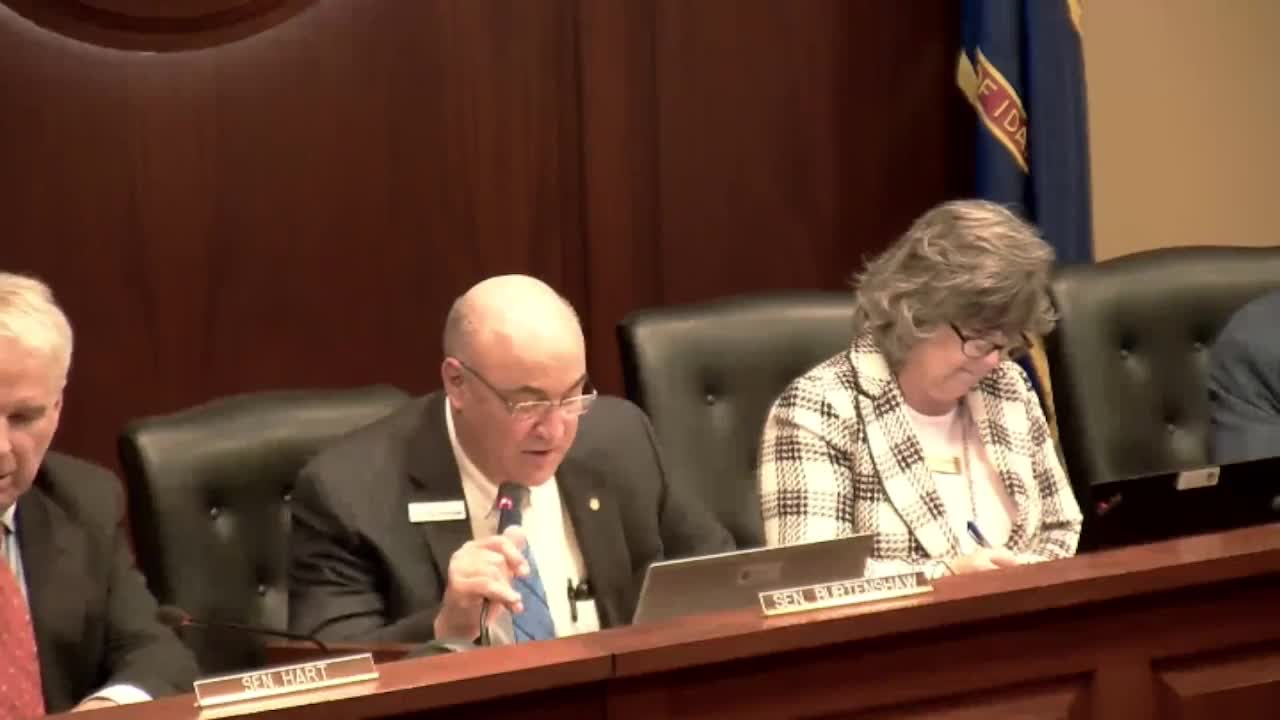Senate committee advances bill to bar people with unpaid fish-and-game fines from buying licenses
Get AI-powered insights, summaries, and transcripts
Subscribe
Summary
The Idaho Senate Resources & Environment Committee voted to send Senate Bill 1003 to the Senate floor with a "do pass" recommendation. The bill would prevent anyone with outstanding fish and game fines from applying for hunting, fishing or trapping licenses or tags until those fines are paid, with specified exceptions and enforcement procedures.
The Idaho Senate Resources & Environment Committee voted to send Senate Bill 1003 to the full Senate with a due-pass recommendation, advancing legislation that would make people with unpaid fish-and-game fines ineligible to apply for hunting, fishing or trapping licenses, tags or permits until their fines are paid.
Senator Dan Foreman, District 6, told the committee that SB1003 would amend Idaho Code section 36-1402 to bar any person with outstanding fines for violations of Idaho fish and game laws from applying for a license, tag or permit until all fines are paid. Foreman said the bill would also apply to holders of lifetime license certificates and would make it a misdemeanor for anyone who is ineligible under the bill to attempt to purchase or renew a license.
The bill includes a point-of-sale mechanism: vendor systems would display a pop-up advising an ineligible purchaser to contact Idaho Department of Fish and Game (IDFG), and the same pop-up would appear on a smartphone using the Go Outdoors Idaho application if an ineligible person tried to renew online. SB1003 would not apply to convicted violators on approved time-payment plans that are not 90 days or more in arrears, Foreman said. He asked the committee to send the bill to the floor with a due-pass recommendation.
Chief Greg Wooten, chief of enforcement for the Idaho Department of Fish and Game, told the committee how the system would operate in practice. Wooten said fines are collected by county courts, and IDFG would rely on formal court judgments before flagging eligibility. "We would not do anything to our system unless we had a formal judgment," Wooten said, adding that some judgments can include license revocation periods ranging from one to three years. He also said misdemeanor judgments include a 45-day appeal period during which the agency typically waits before enforcing eligibility changes.
Wooten explained how lifetime certificate holders are handled: the certificate entitles the holder to a free annual license that expires Dec. 31 and must be reissued each year, so the system can flag lifetime holders when they interface with licensing systems. He said the change has been coordinated with IDFG enforcement.
Committee members questioned how appeals, ongoing court processes and controlled-hunt applications would be affected. Wooten said applicants must have a hunting license before applying for controlled hunts, and that if a case is ongoing the individual remains eligible until a formal judgment and the 45-day appeal period lapse.
Committee members also asked about collection efforts. Wooten described IDFG's internal notification process and use of private collection agencies: IDFG sends multiple notices over several months, then refers unpaid accounts to collections; collection agencies remit the principal to the agency and keep a fee (Wooten said collection fees can be about 33.5 percent).
Nick Faciano, executive director of the Idaho Wildlife Federation, testified in support of SB1003 but asked the committee to ensure people are not denied licenses because of court timing. "We want to make sure that no one's denied the ability to apply for hunting and fishing licenses because of a timing issue," Faciano said.
Ellery Tucker Williams, legislative and community engagement coordinator for IDFG, said the Fish and Game Commission supports the bill and asked the committee to send it to the floor with a due-pass recommendation.
In closing remarks, Senator Foreman said the bill balances Idaho's recognition of hunting, fishing and trapping as rights with the legislature's authority to set conditions: "If you've gone through due process and you've been rightly convicted and fined and you refuse to pay the fine... until you pay up, you don't get to play," he said.
Senator Taylor moved to send SB1003 to the floor with a due-pass recommendation; the motion was seconded by Senator Hart and carried. Senators Cole and O'Connorowitz asked to be recorded as voting no. The bill now proceeds to the Senate floor.
Votes at the committee meeting on SB1003 were procedural (send to floor with recommendation); no final veto-proof or enactment votes occurred at this hearing.
